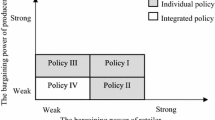Abstract
The paper addresses a problem of inventory control in a two-echelon retailer-customer setting. The problem incorporates the reputation of the retailer as a key factor influencing its policy. The retailer’s reputation depends on the degree to which past demand was satisfied. In turn, the reputation impacts the distribution of future demand. The optimality conditions developed by means of a perturbation analysis technique enable an optimal base-stock policy, in which the current level of base-stock depends on the retailer’s current reputation.





Similar content being viewed by others
References
Barnett, M. L., & Hoffman, A. J. (2008). Beyond corporate reputation: Managing reputational interdependence. Corporate Reputation Review, 11, 1–9.
Barnett, M. L., Jermier, J. M., & Lafferty, B. A. (2006). Corporate reputation: The definitional landscape. Corporate Reputation Review, 9, 26–38.
Bendixen, M., & Abratt, R. (2007). Corporate identity, ethics and reputation in supplier–buyer relationships. Journal of Business Ethics, 76, 69–82.
Bertsekas, D. P. (1987). Dynamic programming: Deterministic and Stochastic models. Englewood Cliffs, NJ: Prentice Hall.
Ernst, R., & Cohen, M. A. (1992). Coordination alternatives in a manufacturer/dealer inventory. Production and Operations Management, 1, 254–268.
Ernst, R., & Powell, S. G. (1998). Manufacturing incentives to improve retail service levels. European Journal of Operational Research, 104, 437–450.
Gershwin, S. B., Tan, B., & Veatch, M. H. (2009). Production control with backlog-dependent demand. IIE Transactions, 41, 511–523.
Gotsi, M., & Wilson, A. M. (2001). Corporate reputation: Seeking a definition. Corporate Communications: An International Journal, 6, 24–30.
Hall, J., & Porteus, E. (2000). Customer service competition in capacitated systems. Manufacturing and Service Operations Management, 2, 144–165.
Liberopoulos, G., & Tsikis, I. (2007). Competing for customer goodwill on product availability. In Proceedings of the 6th Conference on the Analysis of Manufacturing Systems, Lunteren, The Netherlands.
Liberopoulos, G., Tsikis, I., & Delikouras, S. (2010). Backorder penalty cost coefficient “b”: What could it be? International Journal of Production Economics, 123, 166–178.
van Luin, J., Poutre, H. L., Will, J., & Bertrand, M. (2006). Learning inventory management strategies for commodity supply chains with customer satisfaction. In Proceedings of the 8th International Conference on Electronic Commerce (pp. 59–69). New York: ACM.
Nerlove, M., & Arrow, K. J. (1962). Optimal advertising policy under dynamic conditions. Economica, 29, 129–142.
Robinson, L. W. (1990). Appropriate inventory policies when service affects future demands. Working paper, Cornell University.
Schwartz, B. (1966). A new approach to stockout penalties. Management Science, 12, 538–544.
Schwartz, B. (1970). Optimal inventory policies in perturbed demand models. Management Science, 16, 509–518.
Singer, G., & Khmelnitsky, E. (2010). A finite-horizon, stochastic optimal control policy for a production-inventory system with backlog-dependent lost sales. IIE Transactions, 42, 855–864.
Tan, B., & Gershwin, S. B. (2004). Production and subcontracting strategies for manufacturers with limited capacity and volatile demand. Annals of Operations Research, 125, 205–232.
Veatch, M. H. (2009). The impact of customer impatience on production control. IIE Transactions, 41, 95–102.
Author information
Authors and Affiliations
Corresponding author
Rights and permissions
About this article
Cite this article
Khmelnitsky, E., Singer, G. An optimal inventory management problem with reputation-dependent demand. Ann Oper Res 231, 305–316 (2015). https://doi.org/10.1007/s10479-014-1600-z
Published:
Issue Date:
DOI: https://doi.org/10.1007/s10479-014-1600-z



